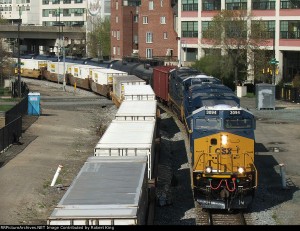Governor Wolf asks Obama to strengthen oil train safety

Courtesy of Robert King
The CSX K040, an oil train bound for South Philadelphia, chugs past an intermodal train through Center City.
Writing that the “potential for disaster is too great to ignore,” Pennsylvania Gov. Tom Wolf has sought help from President Obama regarding oil train safety. In a letter to the President, Wolf wrote the “tools and options available to me are limited.” The recent oil train derailment in West Virginia has focused more attention on the safety of crude oil transport. Shipments have risen in the past several years because of the shale oil boom in North Dakota, and the lack of pipeline infrastructure to carry all that crude to refineries on the East Coast. Pennsylvania has experienced four train derailments since January 2014. Two of those derailments happened in heavily populated Philadelphia, but none resulted in a fire.
In the letter to Obama, Wolf says about 60 to 70 oil trains pass through Pennsylvania each week on their way to refineries in Philadelphia and New Jersey. Based on information filed by CSX and Norfolk Southern with the Pennsylvania Emergency Management Agency last May, StateImpact calculated that Philadelphia could be getting up to 42 oil trains a week, while up to 30 oil trains could be rolling through Pittsburgh each week. The companies are only required to report the trains carrying more than 1,000,000 gallons of crude. So those numbers don’t include trains carrying less. A train with at least 45 tank cars, each carrying 700 barrels of oil a piece, would be needed to exceed the one million gallon threshold. The CSX train that derailed in Mount Carbon, West Virginia last week had 109 tank cars carrying more than 3 million gallons of crude oil.
Wolf says oil train safety is a top priority for his administration and he has already met with Norfolk Southern executives, and and says he plans to meet with CSX employees to talk about lowering the risk of derailments in Pennsylvania. The governor directed the state fire commissioner to study how to extinguish an oil train fire. He also participated in an emergency planning exercise modeling response to a derailment in a heavily populated urban area.
Adding to the concern, the federal Department of Transportation released a report this week predicting that up to 15 derailments of trains carrying crude oil and ethanol could occur each year. And if that were to occur in urban areas, could cause loss of life and and billions in property damage.
Governor Wolf laid out four requests to the President:
First, consistent national standards to reduce the volatility of crude oil prior to transportation are a must. North Dakota currently is taking steps in this regard. But we have to ensure all Bakken crude has been treated to remove dangerous volatiles and is transported under the appropriate pressure and other relevant conditions
Second, current federal standards have reduced speeds to forty miles-per-hour in high-density urban areas. It is instructive to note that recent derailments and explosions have occurred at speeds less than this limit. I therefore respectfully request further review of this matter and revisions to the speed limit as necessary to ensure against explosive derailments.
Third, inspections by government inspectors of rail infrastructure must be enhanced. In Pennsylvania we have only six inspectors trained with the support of federal resources, even though we have some five thousand miles of track, among the highest in the nation. I request additional federal assistance to assist us in hiring and training an adequate number of rail safety inspectors.
Fourth, the current standards for tank cars and braking systems are not sufficient. Recent accidents in West Virginia and Ontario both led to large oil fires, even though the tank cars were of new and more stringent design. Braking systems and tank car standards must be enhanced to reduce risk.
This letter comes on the heels of a push by Senator Bob Casey to get the Obama administration to speed up implementation of new rail safety rules.
















